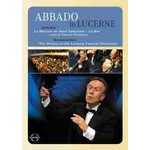
Abbado in Lucerne (concert & documentary)
 $46.00
Out of Stock
$46.00
Out of Stock6+ weeks add to cart
CLAUDE DEBUSSY
Abbado in Lucerne (concert & documentary)
Lucerne Festival Orchestra, Claudio Abbado
[ EuroArts Music DVD / DVD ]
Release Date: Monday 20 October 2008
This item is currently out of stock. It may take 6 or more weeks to obtain from when you place your order as this is a specialist product.
 Suitable for General Audiences
Suitable for General Audiences
"For some the main attraction of Abbado in Lucerne will be the great Italian maestro conducting Debussy at the 2003 Lucerne Festival. For others it's the documentary, with its footage of some of the last century's greatest conductors in action: every brief glimpse adds flesh and bones to the names that adorn the labels of treasured discs by Ansermet, Fricsay, Kempe, Furtwängler and de Sabata. The film is confusingly structured, however, and though it confronts admirably Karajan's ruthless use of Lucerne to reinvent himself after his denazification, the commentary sounds like something written by the Swiss Tourist Board.
Barbirolli is filmed in Vancouver rehearsing the Haydn-attributed Oboe Concerto with his wife as soloist, who, as in her 1957 recording with the Hallé, plays her own cadenzas. All eyes are on JB (indeed, it's some time before we're aware that the soloist is at the rehearsal at all) but there is one lovely exchange when Rothwell suggests that they start again from the repeat of the second subject. 'Well, I don't know what the second subject is,' retorts her husband. 'That's for programme annotators.' George Szell, who died in the same year as Barbirolli (1970), was, by contrast, unpopular and despotic. The colour film profiles - but does not explore or question - his extraordinary 24-year relationship with the Cleveland Orchestra. With his lupine smile and fearsome presence, he tries to play the role of regular guy: rehearsal and performance sequences are riveting, with fascinating footage of him instructing three young conductors (James Levine one of them) on how to kickstart Don Juan and Beethoven's Fifth. With the hooded eyes of a falcon and his sour mien, Szell's fellow Hungarian, Fritz Reiner looks as unpleasant as his reputation conducting the Chicago Symphony in 1953-4 at the start of his celebrated nine-year association with the orchestra. These black-and-white transmissions (sometimes more black than white) of one of the truly great conductors are of immense importance, and include one work (the Bach-Weiner) that Reiner did not record commercially. The DVD preserves Francis Coughlin's hopelessly unprepared in-vision linking commentary: every faultering sentence makes you thank God for the invention of the autocue. The Stravinsky documentary features the famous (and equally toe-curling) encounter between the young Julian Bream and the elderly composer. Just as Stravinsky is about to start recording his Symphony of Psalms, Bream is introduced, sits down and plays a pavane on the lute … all the way through. As a conductor, Stravinsky is an uninspiring, baton-less time-beater, but the exchanges filmed simultaneously in the control room make for an unusually vivid sequence. Most revealing, though, is Stravinsky's conversation with his friend Nicholas Nabokov, filmed in Hamburg over a glass of whisky. Here, one of music's geniuses appears touchingly vulnerable and human. VAI may be a no-frills merchant but such treasure needs no fancy packaging. Its priceless contents speak for themselves." Gramophone
Tracks:
Debussy: La Mer
Debussy: Le Martyre de Saint Sébastien - Fragments symphoniques